7 Common Cavapoo Health Issues – Advice! (2024)
Health issues are something that many dog owners are concerned about. Like any dog breed, Cavapoos can be more susceptible to certain health problems than others. The best way to keep your pup happy and healthy is to be aware of the most common Cavapoo health issues to watch for in your four-legged friend.
Here, I will be discussing the top seven medical problems concerning Cavapoo owners. Read on to learn more about the causes, symptoms, and options for the most common Cavapoo health issues.

Mitral Valve Disease
Mitral Valve Disease is a genetic cardiac condition affecting the heart’s mitral valve. When the mitral valve malfunctions, it allows blood to flow back into the heart chambers. This disease can be fatal if left untreated and is the leading cause of death amongst Cavalier King Charles Spaniels.
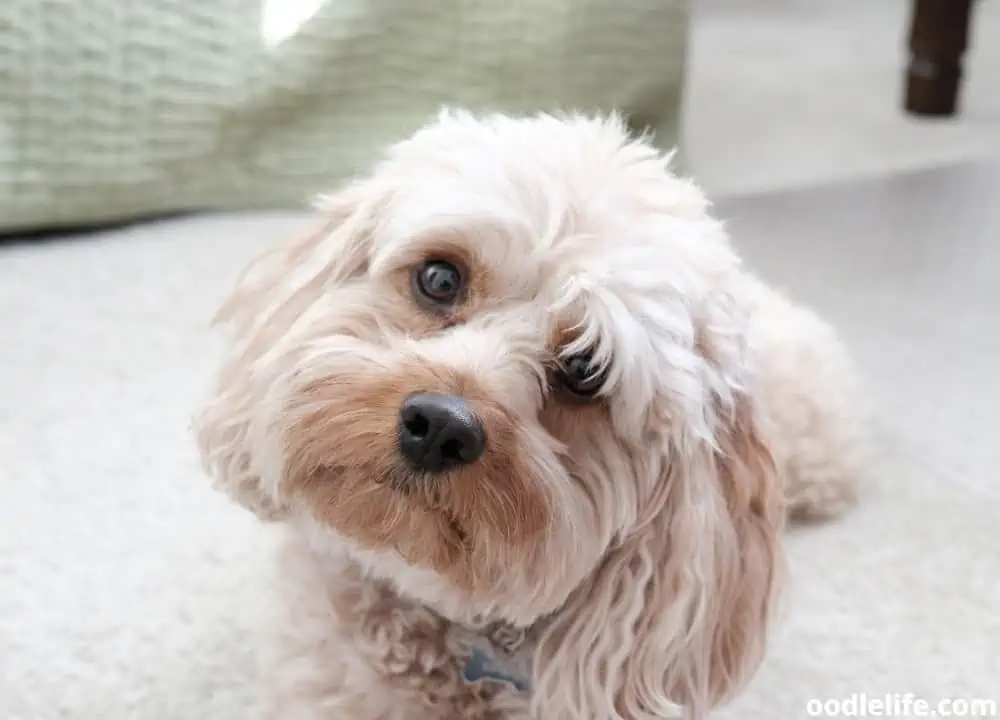
Cavapoos only share half of their DNA with Cavaliers, which reduces their risk of developing genetic issues such as Mitral Valve Disease. However, the condition is still more likely to develop in Cavapoos than in other breeds.
The most common symptoms in dogs include heart palpitations, shortness of breath, and dizziness. If you notice your dog exhibiting signs of Mitral Valve Disease early enough, you can treat them with medication prescribed by your vet. More advanced cases may require surgery.
Progressive Retinal Atrophy
Progressive retinal atrophy, or PRA, is another relatively common genetic condition in Cavapoos. It gets passed down from the Poodle parent instead of from the Cavalier side.

As the name suggests, progressive retinal atrophy happens when photoreceptor cells in the retina start to degenerate. This disease only affects dogs that are genetically predisposed to developing it.
Unfortunately, there is no known cure to date for PRA. Dogs with this condition will gradually lose their sight with age as photoreceptor cells break down. Eventually, it will lead to complete blindness during a dog’s older years.
Fortunately, PRA is not painful for your pup. Though it may be harder to see during playtime, they shouldn’t be in any pain or discomfort.

Owners should keep in mind that sight loss can be stressful for older dogs, especially those with anxiety issues. Be patient, gentle, and mindful of your pup as you go about your day. They may need more interaction to put them at ease.
It can also help if you set up safe and accessible accommodations in your home.
Hip Dysplasia
You typically see hip dysplasia in larger, heavier dog breeds. Their size can place stress on sensitive joints. Genetics also plays a role in the condition, leaving some smaller breeds susceptible as well.
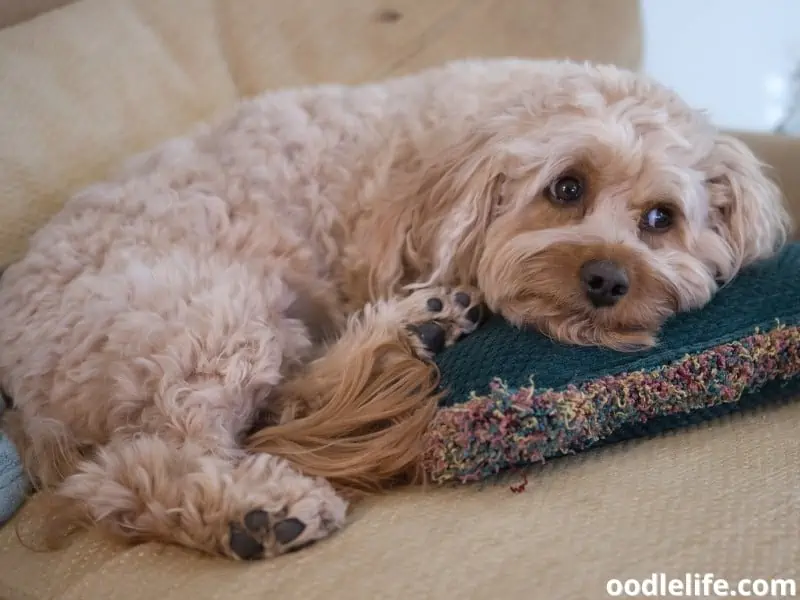
Hip dysplasia involves deformities in the ball and socket joint of the hip, which can cause painful movement when walking or running. Owners may notice their dog is less active than usual or has trouble moving. Some dogs may also lose muscle mass in the legs and hindquarters.
Both Poodles and Cavalier Spaniels are prone to hip dysplasia. As a result, Cavapoos are more likely to develop the condition than other small dogs. Overweight Cavapoos are especially at risk since the extra mass adds stress to joints.

In some instances, physical therapy and a strict weight loss regimen are all it takes to ease the symptoms of hip dysplasia. More advanced cases may require medication such as joint supplements and anti-inflammatories or even surgical intervention.
Syringomyelia
Syringomyelia is an unfortunately common hereditary condition in Cavalier King Charles Spaniels. It affects this breed more than any other and can get passed down to Cavapoo offspring.
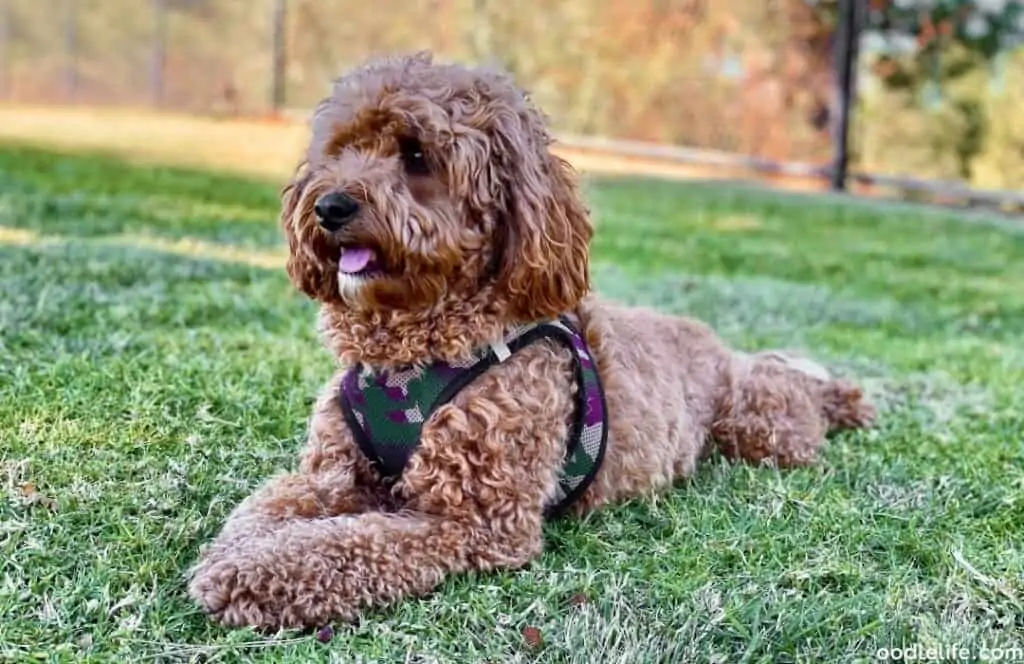
Dogs with Syringomyelia have fluid-filled cavities that develop around their spine. These cysts can press against the spinal cord, pressing against nerves and potentially causing brain damage. They often occur near the brain, leading to sensitivity around the neck.
The most common sign of Syringomyelia is pain around the head, neck, and back. Dogs may flinch or wince when you touch these areas. You may also notice weakness, lethargy, and whining in more vocal Cavapoos.
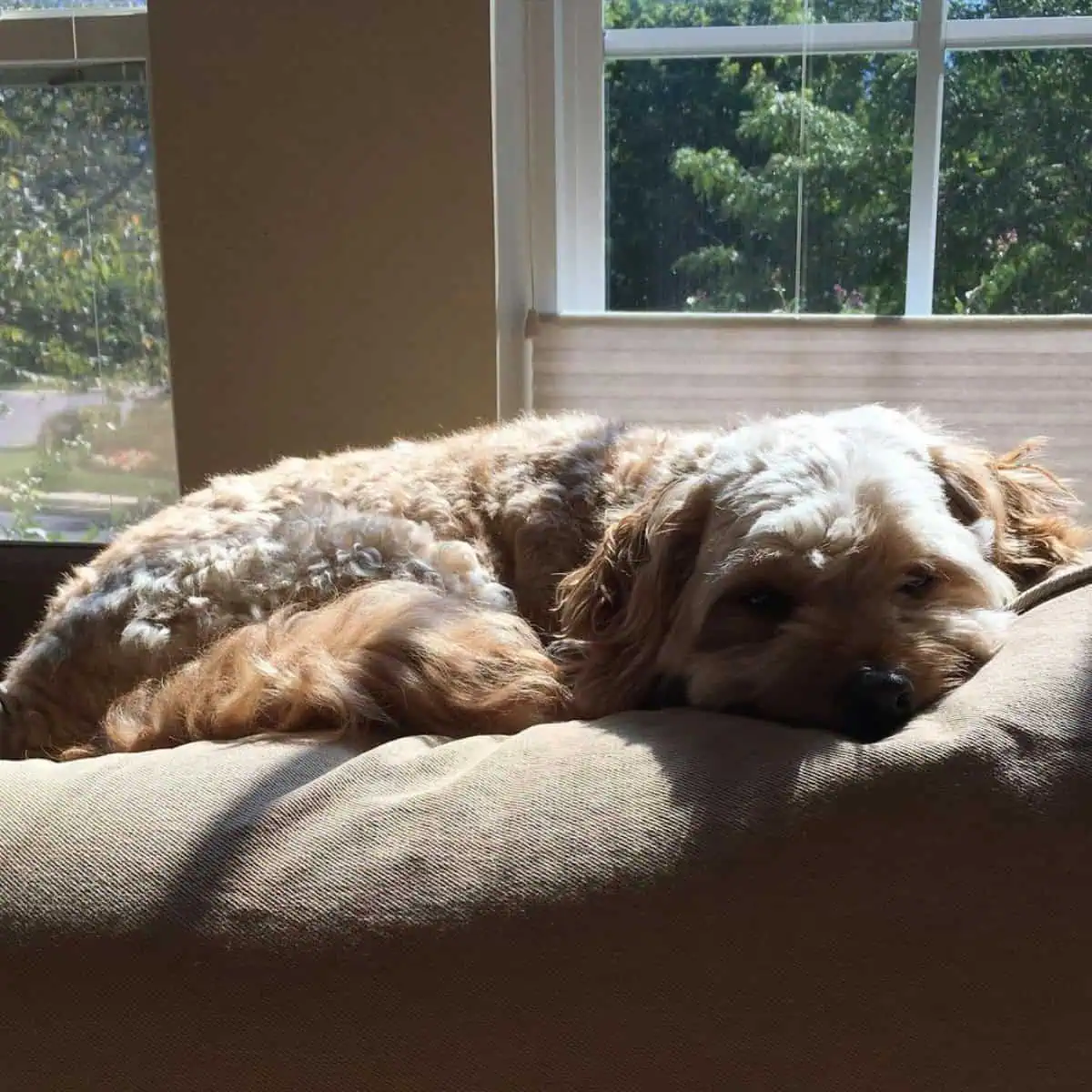
In extreme cases, dogs may suffer from seizures and paralysis.
If you notice your dog showing signs of Syringomyelia, you may be able to stop symptoms through early intervention. Anti-inflammatory medications and physical therapy can help to prevent nerve damage. If non-invasive treatments don’t work, surgical options can also remove dangerous cysts.
Epilepsy
Both Poodles and Cavaliers are genetically predisposed to develop epilepsy. This is a challenging condition for dogs and owners alike. While epilepsy is not often fatal, it requires special management and plenty of TLC to keep under control.

Because Poodles and Cavaliers can both pass on the genes for epilepsy, Cavapoos are at risk of inheriting the condition. It’s important to watch for signs of epilepsy in Cavapoos of all ages, especially puppies. The condition is characterized by seizures that can manifest in different ways.
Fortunately, it’s fairly easy to manage epilepsy in dogs. Your vet can prescribe tried and tested medications such as Phenobarbital and Imepitoin to help control seizures. You can also help to control symptoms of epilepsy by providing a safe, calming environment for your pet.
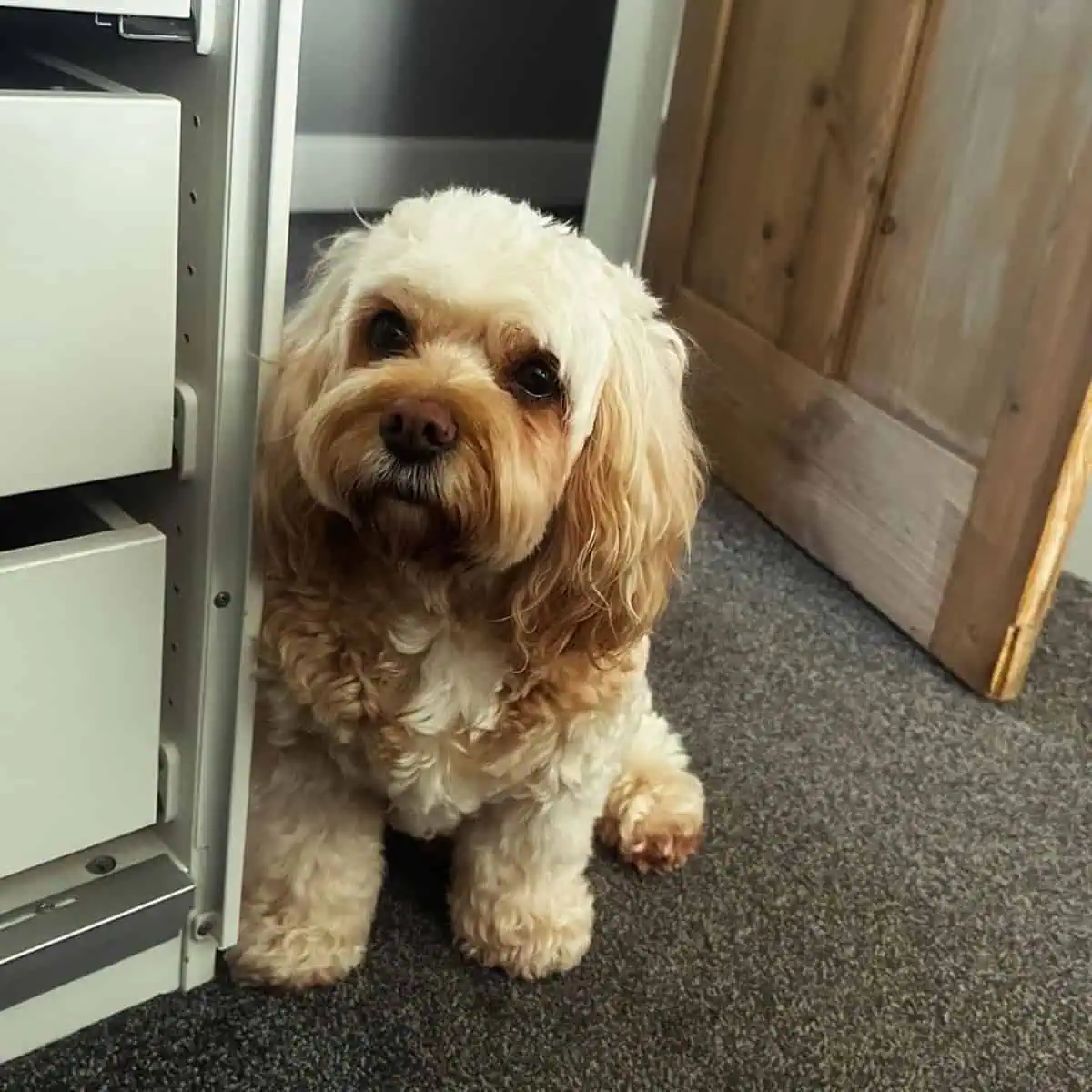
Remove anything that might lead to overstimulation, including bright lights and loud noises.
Luxating Patella
Some Cavapoo health issues are not necessarily genetic but still commonplace in the population. Their small size makes Cavapoos susceptible to conditions such as patellar luxation.

The patella, or kneecap, should be positioned atop the knee joint in a healthy dog. It can cause pain, weakness, and difficulty moving when it shifts out of place. Small dogs such as Cavapoos are likely to have shallow knee sockets that encourage excessive patella movement.
Symptoms of a luxating patella often include limping, and lameness as dogs try to put weight on their injured joints. The condition isn’t always painful, but if your dog is experiencing discomfort, you may notice lethargy, anxiety, and whining.
In some cases, you may be able to treat a luxating patella with simple control exercises that guide the kneecap back into place. For more severe cases, your vet may recommend surgery to reset the patella.
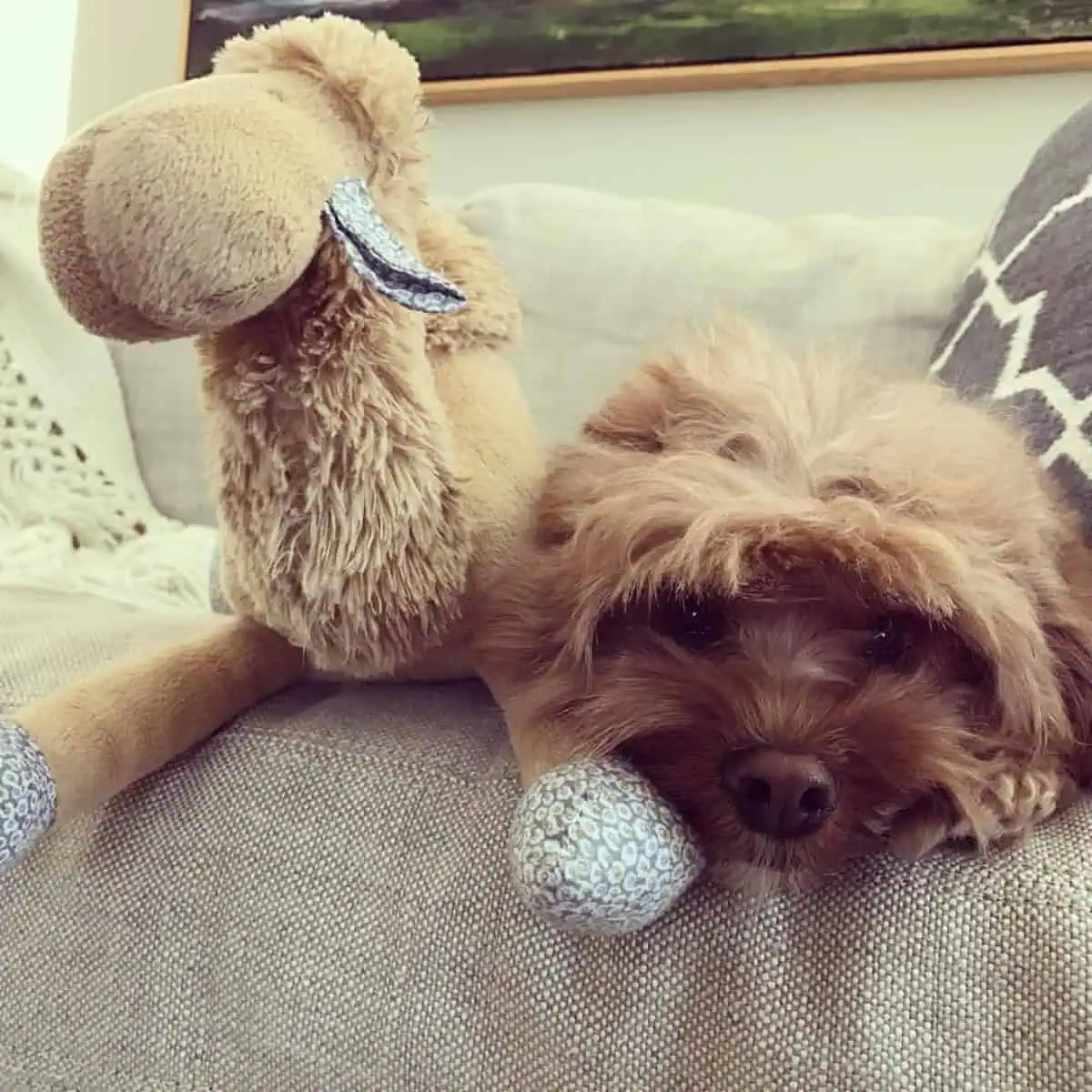
In some cases, it may not be possible to correct patellar luxation. In these cases, it’s best to focus on pain management instead. Your vet may recommend surgery to reset the patella for more severe cases.
Adjustments to your and your pup’s lifestyle can also help reduce pain and inflammation. You can add stairs or ramps to your living setup so that your pup doesn’t stress its knees by jumping. It can also help if you adjust beds, food bowls, and more to reduce knee usage.
Hernias
The Cavalier King Charles Spaniel is more likely to develop inguinal hernias than other dog breeds. It can pass this genetic susceptibility onto its offspring, including cross breeds like Cavapoos.

A hernia occurs when organ tissue protrudes through the surrounding muscle. It can be painful and if left untreated, may lead to a serious infection. Symptoms of hernias in dogs include a loss of appetite, excessive drooling, nausea and vomiting, and shortness of breath.
In serious cases, it may lead to an infection or even sepsis.
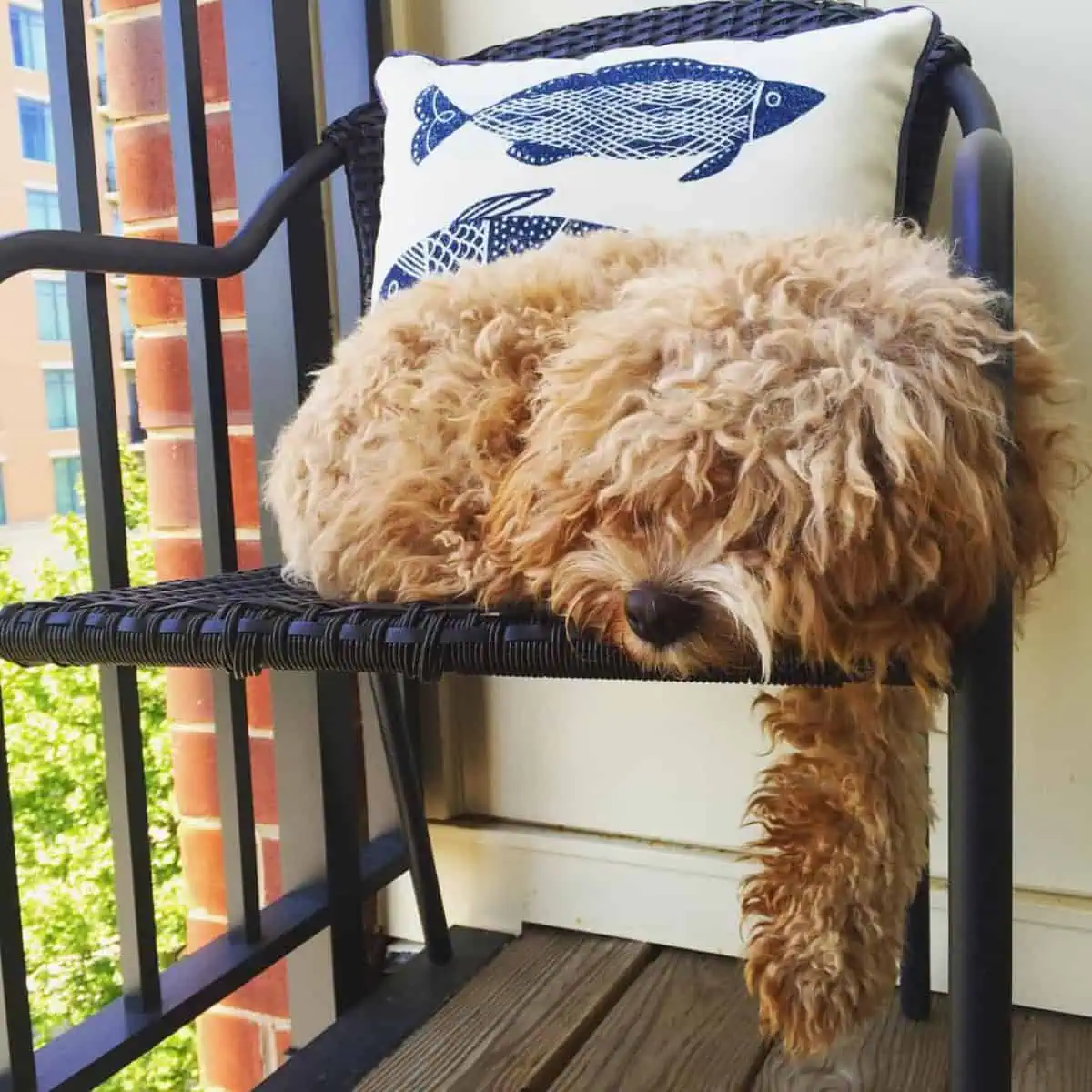
Most hernias resolve on their own, but some may require treatment. Your dog may need surgery to repair its muscle wall and prevent future problems. If a hernia has caused an infection, you may need to give your pup a course of antibiotics prescribed by your vet.
Conclusion
As a crossbreed, Cavapoos have a lower risk of genetic diseases commonly found in purebred dogs. However, this doesn’t mean they aren’t susceptible to certain health conditions, especially those affecting their parent breeds.
Knowing the most common Cavapoo health issues can help you recognize when it’s time to see the vet. By keeping a close eye on your pet, you can address any potential problems early on so that your pup stays happy and healthy.